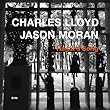 By Daniel Garrett
By Daniel Garrett
Charles Lloyd and Jason Moran, Hagar’s Song
Produced by Charles Lloyd and Dorothy Darr
ECM, 2013
Hagar’s Song, the recording by saxophonist and flutist Charles Lloyd and pianist Jason Moran, is sumptuous and warm, with an accessible reverie—hills and valleys, inspiring pleasure as well as thought: music at a significant level of mastery. Jason Moran has made a name for himself as a creative, intellectual, forward-looking musician. Inspired in music by other composers and by the work of visual artists such as the painters Jean Michel Basquiat, Egon Schiele, and Robert Rauschenberg, Jason Moran has been associated with galleries and museums; and has collaborated with visual artists Glenn Ligon and Kara Walker on their videos, and worked on a multi-media performance and film on Thelonious Monk. I had heard a little of the young pianist’s music, and wanted to hear much more. Jason Moran’s work with saxophonist and flutist Charles Lloyd—on Hagar’s Song, inspired by a female ancestor of Lloyd—is a great opportunity. It is also a nice example of the meeting of generations. The musical compositions here are “Pretty Girl,” “Mood Indigo,” “Bess, You Is My Woman Now,” “All About Ronnie,” “Pictogram,” “You’ve Changed,” “Hagar Suite,” “Rosetta,” “I Shall Be Released,” and “God Only Knows.” Although it has a title that suggests something light and sensuous, here Billy Strayhorn’s “Pretty Girl” has a reverent, serene sound, suggesting beauty and unity, and it could be a hymn. Duke Ellington’s “Mood Indigo” is swinging, with a medium fast tempo. George Gershwin’s “Bess, You Is My Woman Now” is somber and slow. Attractive, contemplative, soothing is Joe Greene’s “All About Ronnie,” like much else here; and there is yearning in some of the horn playing. Charles Lloyd’s own “Pictogram” is almost pure energy, with the saxophone and piano playing two different rhythms, forming a modern sound of contrast and speed, especially in its piano runs.
The boy prodigy Charles Lloyd, now a musical elder, was born in the late 1930s and mentored by pianist Phineas Newborn, and Lloyd worked with B.B. King and Howlin’ Wolf, before graduating from the University of Southern California with a master’s degree. It must have been vastly interesting for Lloyd to study with a Bartok specialist during the day and play with Ornette Coleman and Eric Dolphy at night. Charles Lloyd’s formative era was one in which ambitious people knew they had things to learn and went about learning them. Lloyd, who had been inspired by Duke Ellington and Charlie Parker and Billie Holiday, would play with Chico Hamilton and Don Cherry, Ron Carter, Keith Jarrett and other distinguished musicians. Charles Lloyd recorded his own music with his own group, becoming Downbeat magazine’s 1967 jazzman of the year. No one was confused about who the creative men and women in jazz were. Lloyd’s fusion music was broadly attractive and he played with rock groups, such as the Doors and the Beach Boys. The Memphis-born Lloyd, a man of African, Cherokee, Mongolian and Irish ancestry, was attracted to classical and experimental music, to jazz and popular music, American and international. For the last several decades, following a retirement, Lloyd has been active and revered as a master. Charles Lloyd’s album Hagar’s Song, featuring a suite composed around the subject of Lloyd’s enslaved great-great grandmother, contains some well-established songs: “You’ve Changed” and “God Only Knows” and “I Shall Be Released.” By Carl Fischer, but identified with Billie Holiday, the sad ballad “You’ve Changed” as interpreted by Lloyd and Moran retains an intimate, late-at-night ambiance. Jason Moran, whose recordings include Soundtrack to Human Motion (1999) and The Bandwagon (2003) and Same Mother (2005), has worked with Cassandra Wilson, Wayne Shorter, and Don Byron, Bunky Green, Christian McBride, Paul Motian, Meshell Ndegeocello, and Sam Rivers, and taught at the Manhattan School of Music and Yale; and Moran is an ideal collaborator for Charles Lloyd.
The Hagar suite, compositions ten to eleven on the album, composed by Charles Lloyd, is made up of “Journey Up River,” “Dreams of White Bluff,” “Alone,” “Bolivar Blues,” and “Hagar’s Lullaby.” With a somewhat foreign quality, “Journey Up River” is both strange and jazzy. The saxophone has a hushed, hollowed, echoing quality—breathy, ethereal. The piano is quintessential jazz, and the percussion—tambourine? (yes: Moran)—adds an earthy, tribal aspect. A reverie, “Dreams of White Bluff,” is sprightly and soulful. Confident, direct, with a bright sound, “Alone” is infused with a rhythm that recalls Native American music. The supporting percussion does not take away from that quality. (There is both saxophone and flute in the song.) “Bolivar Blues,” often fast and intense, has energy and quiet, with soft saxophone playing, and short thick piano rhythms. “Hagar’s Lullaby” is declarative, strong—but it is a strength that does not deny or vanquish softness, as there is something soft there, and a glimmer of repeated rhythm near the end.
The melodic “Rosetta,” written by Earl Hines, begins with uptempo swing, and has bluesy piano lines. Bob Dylan’s “I Shall Be Released” is as lovely as anything else here, carrying both beauty and seriousness—and it, somewhat plaintive, does not sound like the sung versions I have heard. Mellow and sweet, Brian Wilson’s “God Only Knows” is recognizable, with a thoughtful quality.
Daniel Garrett, a graduate of the New School for Social Research, and the principal organizer of the Cultural Politics Discussion Group at Poets House, is a writer whose work has appeared in The African, All About Jazz, American Book Review, Art & Antiques, The Audubon Activist, Black Film Review, Changing Men, Cinetext, Contact II, Film International, The Humanist, Hyphen, Illuminations, Muse Apprentice Guild, Option, Pop Matters, Quarterly Black Review of Books, Rain Taxi, Red River Review, Review of Contemporary Fiction, Wax Poetics, and World Literature Today. Daniel Garrett has written extensively about international film for Offscreen, and comprehensive commentary on music for The Compulsive Reader.